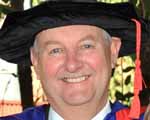 A social work graduate from Charles Sturt University (CSU) has reflected on what she has learnt during her initial years in her career working in rural and remote NSW.
A social work graduate from Charles Sturt University (CSU) has reflected on what she has learnt during her initial years in her career working in rural and remote NSW.Now in Orange in regional NSW, Ms Alice Munro is employed as a Social Worker by the Health Education and Training Institute.
The CSU graduate is also the Social Work Council Member of a national body called Future Health Leaders, which will hold its national forum at CSU in Orange on Saturday 21 September. Read more on CSU News here.
In a recent article, ‘Reflections from an early career rural social worker’ for the Victorian branch of the Australian Association of Social Workers (AASW), Ms Munro outlined how she completed school at the Boort Secondary College (now Boort District School) in central Victoria with a burning desire to ‘be a social worker’. She fulfilled that desire and graduated from CSU with a Bachelor of Social Work (Honours) in 2010.
Ms Munro spent the first four years of her career as a Drug and Alcohol Outreach Worker for the Murdi Paaki Drug and Alcohol Network, a partnership of five organisations.
“The Murdi Paaki region of NSW covers 297 000 square kilometres extending from the Queensland border to Dareton on the Victorian border,” Ms Munro said.
“I travelled to remote areas of NSW including Lightning Ridge, Wilcannia and Bourke.
“My experience working in the remote and diverse Murdi Paaki region so early in my professional life was challenging but pivotal in shaping my identity as a social worker.
“Despite being passionate about my work, I learnt of the need to be patient, go steady and keep listening. This led me to true two-way learning in the Aboriginal communities I worked in.
“Also my experiences have highlighted the important role for professional mentors for health workers in isolated areas.
“Self care and worker well-being should remain high priorities. They can all too often be left off the list with burnout in the field a reality. I have been pleased to learn that the social work professional places a strong emphasis on critical reflective practice,” Ms Munro said.
 Course Director with the School of Humanities and Social Sciences at CSU in Wagga Wagga Dr Bill Anscombe said “Alice is an excellent example of the way rural people who are educated as social workers in rural areas can make an outstanding contribution to rural and national priorities on the important issue of health.
Course Director with the School of Humanities and Social Sciences at CSU in Wagga Wagga Dr Bill Anscombe said “Alice is an excellent example of the way rural people who are educated as social workers in rural areas can make an outstanding contribution to rural and national priorities on the important issue of health. “The inequalities of health outcomes for rural Australians mean that as a matter of social justice, Charles Sturt University and its graduates have a critical and positive role to play in the development of a fairer and healthier Australia.
“Alice combines the qualities of compassion and passion; intelligence and commitment; and the capacity to articulate needs and priorities in the interests of serving 'the public good’.”
The Bachelor of Social Work is offered on campus and by distance education. Read more here.





Social
Explore the world of social